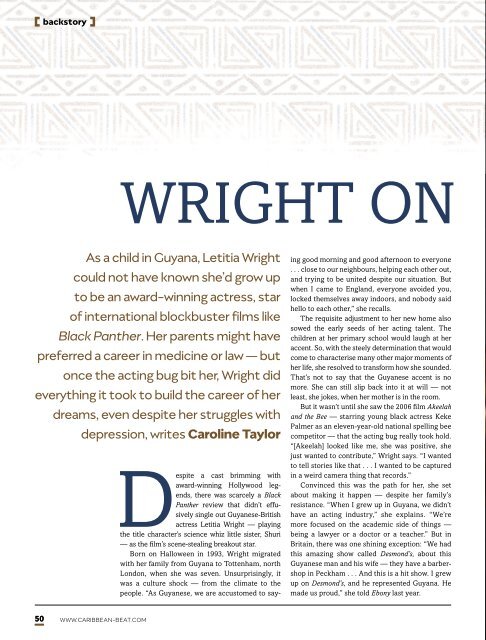Caribbean Beat — May/June 2019 (#157)
A calendar of events; music, film, and book reviews; travel features; people profiles, and much more.
A calendar of events; music, film, and book reviews; travel features; people profiles, and much more.
Create successful ePaper yourself
Turn your PDF publications into a flip-book with our unique Google optimized e-Paper software.
ackstory<br />
Wright on<br />
As a child in Guyana, Letitia Wright<br />
could not have known she’d grow up<br />
to be an award-winning actress, star<br />
of international blockbuster films like<br />
Black Panther. Her parents might have<br />
preferred a career in medicine or law <strong>—</strong> but<br />
once the acting bug bit her, Wright did<br />
everything it took to build the career of her<br />
dreams, even despite her struggles with<br />
depression, writes Caroline Taylor<br />
Despite a cast brimming with<br />
award-winning Hollywood legends,<br />
there was scarcely a Black<br />
Panther review that didn’t effusively<br />
single out Guyanese-British<br />
actress Letitia Wright <strong>—</strong> playing<br />
the title character’s science whiz little sister, Shuri<br />
<strong>—</strong> as the film’s scene-stealing breakout star.<br />
Born on Halloween in 1993, Wright migrated<br />
with her family from Guyana to Tottenham, north<br />
London, when she was seven. Unsurprisingly, it<br />
was a culture shock <strong>—</strong> from the climate to the<br />
people. “As Guyanese, we are accustomed to saying<br />
good morning and good afternoon to everyone<br />
. . . close to our neighbours, helping each other out,<br />
and trying to be united despite our situation. But<br />
when I came to England, everyone avoided you,<br />
locked themselves away indoors, and nobody said<br />
hello to each other,” she recalls.<br />
The requisite adjustment to her new home also<br />
sowed the early seeds of her acting talent. The<br />
children at her primary school would laugh at her<br />
accent. So, with the steely determination that would<br />
come to characterise many other major moments of<br />
her life, she resolved to transform how she sounded.<br />
That’s not to say that the Guyanese accent is no<br />
more. She can still slip back into it at will <strong>—</strong> not<br />
least, she jokes, when her mother is in the room.<br />
But it wasn’t until she saw the 2006 film Akeelah<br />
and the Bee <strong>—</strong> starring young black actress Keke<br />
Palmer as an eleven-year-old national spelling bee<br />
competitor <strong>—</strong> that the acting bug really took hold.<br />
“[Akeelah] looked like me, she was positive, she<br />
just wanted to contribute,” Wright says. “I wanted<br />
to tell stories like that . . . I wanted to be captured<br />
in a weird camera thing that records.”<br />
Convinced this was the path for her, she set<br />
about making it happen <strong>—</strong> despite her family’s<br />
resistance. “When I grew up in Guyana, we didn’t<br />
have an acting industry,” she explains. “We’re<br />
more focused on the academic side of things <strong>—</strong><br />
being a lawyer or a doctor or a teacher.” But in<br />
Britain, there was one shining exception: “We had<br />
this amazing show called Desmond’s, about this<br />
Guyanese man and his wife <strong>—</strong> they have a barbershop<br />
in Peckham . . . And this is a hit show. I grew<br />
up on Desmond’s, and he represented Guyana. He<br />
made us proud,” she told Ebony last year.<br />
50<br />
WWW.CARIBBEAN-BEAT.COM


















